
|
MONTGOMERY'S EXPEDITION:
When the news came of the British assault on Boston, New York realized that the war was inevitable. The state
determined to create a new regiment of soldiers, the 3rd New York, and Henry's brother Gilbert was able to
convince the politicians in Albany to give the position of Major of the new regiment to Henry. Leaving behind
his new wife and daughter, Henry joined the regiment, which was assigned to invade Canada and take Montreal
from the British. During Henry's enlistment, he kept a journal of his service from August to December, 1775.
|
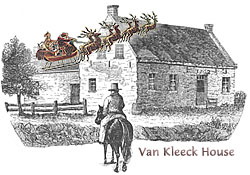
|
POUGHKEEPSIE CONVENTIONS:
New York State Legislature:
For several years during the Revolutionary War, the New York
legislature met in Poughkeepsie. Many of
Henry's friends and family, including his brother Gilbert, were members of the Revolutionary congresses,
the doings of which filled the local papers.
New York Ratifies the Federal Constitution:
Once the U.S. Constitution was written in Philadelphia by, among others, Henry's cousin Robert Livingston,
copies were sent to the 13 states for their approval and ratification. The convention for New York's ratification
took place in Poughkeepsie, in an atmosphere of intense political maneuvering. When the smoke cleared, New York
had ratified the constitution, and one of the deciding votes that created this country was cast by Henry's
brother Gilbert.
In a book on the "What Ifs" of history by Chamberlin, the question is put,
"[What] If Gilbert Livingston Had Not Voted New York Into the Union."
The answer Chamberlin gives is that Rhode Island and North Carolina would have not ratified the constitution,
and the country would never have been joined into a truly United States.
The Anti-Federalist Paper No. 65 was co-written by brother Gilbert Livingston and Chancellor John Lansing.
Minutes of the ratification debate were kept by a number of the delegates.
The incomplete notes of brother Gilbert are in the New York Public Library.
|
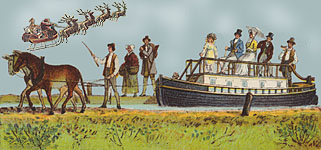
|
THE ERIE CANAL:
Initiated by Henry's brother-in-law, Jonas Platt, the Erie Canal was a recurring
vision of the future for Henry, a vision he shared frequently with his son and
grandson. The sight of the cavalcade of boats passing by Locust Grove, celebrating the Canal's opening in 1825, must have
brought deep satisfaction to the 75 year old Henry.
|
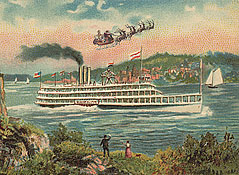
|
THE CLERMONT STEAMBOAT:
"I left New York on Monday at one o'clock, and arrived at Clermont, the seat of Chancellor Livingston, at
one o'clock on Tuesday time, twenty-four hours; distance, one hundred and ten miles. On Wednesday I
departed from the Chancellor's at nine in the morning, and arrived at Albany at five in the afternoon:
distance, forty miles; time, eight hours. The sum is one hundred and fifty miles in thirty-two hours, -
equal to near five miles an hour."
Robert Fulton
The sight and sound of the Clermont, with its steam engine propulsion, must have brought all of Locust
Grove to the riverbank on that August 1807 afternoon.
|
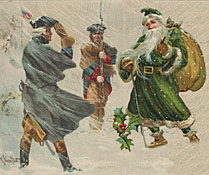
|
WASHINGTON'S INAUGURATION:
The inauguration of George Washington as the first president of this country took place in New York City,
on a balcony overlooking what is now the financial district. On that important day in our history, the
oath of office was administered to President Washington by Robert R. Livingston, Jr., Henry's cousin and the
owner of Clermont.
|
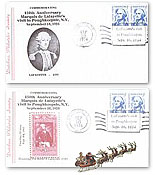
|
LAFAYETTE VISITS POUGHKEEPSIE:
As part of his tour of America, the elderly Lafayette's tour stopped in
Poughkeepsie, where he was welcomed and breakfasted by the town's leading characters.
His welcome speech was given by the son of Henry's brother Gilbert, Colonel Henry Alexander Livingston,
then living in Henry Sr.'s former home on the Hudson, past which Lafayette's steamboat, the James Kent, had
passed in the night.
|











![]() Copyright © 2003, InterMedia Enterprises
Copyright © 2003, InterMedia Enterprises